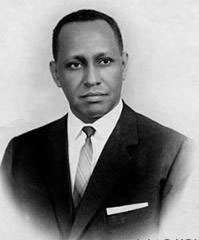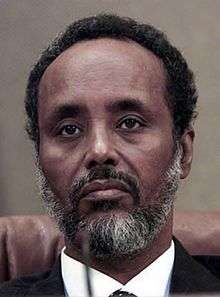Habar Gidir
The Habar Gidir (Somali: Habar Gidir, Arabic: هبر جدير) is a subclan of the Hawiye and the even larger Samaale clan. It is one of the major sub-clans of the Hawiye and Somali clans in general. The clan has produced many prominent Somali figures including the first Prime Minister of Somalia Abdullahi Issa Mohamud and Somalia's fifth President Abdiqasim Salad Hassan. [1][2]

هبر جدير | |
|---|---|
| Languages | |
| Somali and Arabic | |
| Religion | |
| Sunni Islam, Sufism | |
| Related ethnic groups | |
| Abgaal, and other Hawiye and Samaale |
Ethmology

The Habar Gidir are a Hiraab sub-clan.[3] The patriarch of the Habar Gidir is Madarkicis Hiraab one of the sons of Hiraab. He had two wives. His relationship with Asha Karshe Mohamed bore him two children named Sacad and Saleeban. With Raaray Gidir Karanle he had three more children named Sifaadle, Ayr and Suruur. When Asha died he pled with Raaray Gidir to raise and care for his children from Asha as if they were her own. She obliged to his wish. Madarkicis Hiraab's gratitude toward her kind act is eternally shown in how his descendants are not named after him but Raaray Gidir. This is the origin story for where the name Habar Gidir stems from.
Overview
The Habar Gidir are part of the Hiraab. Hiraab consists of the Mudulood, Habar Gidir, and Duduble.[4] The Habar Gidir are also a sub-clan of the Hawiye. This gives the Habar Gidir immediate lineal ties with the other Hawiye sub-clans. The Hawiye descend from Irir Samaale who was one of the sons of Samaale. Due to this the Habar Gidir also have kinship with the Dir (Irir) and the other Samaale sub-clans that are the Hawadle, Ajuran, Degoodi, Masare and Gaalje'el clan groups.[5][6][7][8][9][10][11]
Distribution
The Habar Gidir primarily live in the central regions of Mudug, Galgaduud in Galmudug.[12][13][14] The clan also lives in Southern Somalia especially in (Matabaan district) and sections of (Mogadishu).[15] The clan also lives in the Somali region of Ethiopia in particular the areas neighboring Galmudug. In addition to this the Habar Gidir can also be found in the expatriate communities of the Somali diaspora.
Role and Influence in Somalia
The Habar Gidir clan has produced many prominent Somali figures. The first Prime Minister of Somalia Abdullahi Issa Mohamud was from this clan, he was Habargidir, Sa'ad, Reer Nima'ale.[1] Somalia's fifth president Abdiqasim Salad Hassan was also a member and hailed form the Habagidir, Ayr, Absiiye.[2] They have also held many other important and high ranking positions in governance with a large variety that includes Minister of Economic Affairs, Minister of Foreign Affairs, head of Somali National Security, chief of staff of the Somali armed forces, and many more.[16][17] In addition to this, the Habar Gidir are at the forefront of civics in the central state of Galmudug. The state was conceived and established by them to govern were they traditionally live in central Somalia. Their role in Somali affairs is not limited to only governance. Habar Gidirs also play an important role in business. For instance the head of the Somali airline company Jubba Airways is Habar Gidir. The clan has also produced many influential members of the Somali media. Yusuf Garaad Omar who was the chairman of BBC Somali for over a decade and helped pioneer its rise during his tenure is Habar Gidir. Magool and Hasan Adan Samatar who are among some of the most famous Somali musicians of all time also hail from this clan. Currently the Habar Gidir play a large role primarily in the Somali regions of Galmudug and Banaadir (Mogadishu) but also Somalia as a whole.
Clan tree
Ali Jimale Ahmed outlines the Hawiye clan genealogical tree in The Invention of Somalia:[3]
- Samaale
- Irir
- Hawiye
- Gugundhabe
- Baadicade
- Jiidle
- Murulle
- Jijeele
- Gorgate
- Hiraab
- Mudulood
- Abgaal
- Harti
- Angonyar
- Warsangeli
- Abokor
- Wabudhan
- Da'oud
- Reer Mattan
- Mohamed Muse
- Wa'esli
- Harti
- Wacdaan
- Moobleen
- Ujajeen
- Abgaal
- Habar Gidir
- Sacad
- Saleebaan
- Cayr
- Saruur
- Sifaadle
- Mudulood
- Silcis
- Wadalaan
- Hiraab
- Haskul
- Rarane
- Karanle
- Kaariye Karanle
- Gidir Karanle
- Sixaawle Karanale
- Murusade Karanle
- Fadumo Karanle
- Gugundhabe
- Hawiye
- Irir
Politics
- Abdullahi Issa - 1st Prime Minister of Somalia 1956–1960, Also the Chairman of the Somali Youth League 1949-1960
- General Mohamed Farah Aided - Leader of the United Somali Congress (USC) who ousted Siad Barre's regime then later fought with the Americans.
- Abdiqasim Salad - 5th President of Somalia 2000-2004
- Mohamed Warsame Ali - 1st President of Galmudug
- Abdullahi Ahmed Addow - Former Somalia Ambassador to the United States 1970–1980
- Osman Ali Atto -Somali businessman, affiliated with the Somali National Alliance.
- Asha Haji Elmi - Peace Activist
- Elman Ali Ahmed - Entrepreneur and Social Activist
- Haji Farah Ali Omar - Minister for Economic Affairs of Somalia 1956–1960
- Aden Ayrow - Leader of Al-Shabaab; died in United States air strike, 2008
- Hassan Dahir Aweys - Leader of Hizbul Islam and Head of the council of the Islamic Courts of Somalia
- Ahmed Abdisalam Adan - Former Deputy Prime Minister and Minister of Public Security
- Hussein Mohamed Farrah - Somali National Alliance (SNA), Somalia Reconciliation and Restoration Council (SRRC) and Transitional Federal Government (TFG) leader, son of Mohammed Farah Aidid
- Yusuf Mohammed Siad Inda'ade - Head of Security Affairs for the Islamic Courts Union.
- Mohamoud Mohamed Guled - Former Minister of Public Works and Housing and Minister of Interior
- Mohamed Warsame Ali - 1st President of Galmudug state.
- Mohamed Ahmed Alin - 2nd President of Galmudug state.
- Abdi Hasan Awale Qeybdiid - Former Somali police Chief and 3rd President of Galmudug state
- Abdikarim Hussein Guled - Former Minister of National Security of Somalia, Minister of Interior and Federal affairs, 4th President of Galmudug state.
- Ahmed Duale Gelle - 5th President of Galmudug state.
- Ahmed Abdi Kariye - 6th President of Galmudug state.
- Ahmed Moalim Fiqi - Former Director of the National Intelligence and Security Agency (NISA).
- Yusuf Garaad Omar - Former Somalia ambassador to the United Nations and Minister of Foreign Affairs.
- Abdi Mohamed Sabriye - Minister of Interior and Federal Affairs of Somalia
- Abdirahman Mohamed Husen - Former Minister of Interior and Federal Affairs of Somalia
- Abdisamad Moalim Mohamud Sheikh Hassan - Former Minister of Interior and National Security
- Mohamed Ali Hassan - Former Chief minister of Galmudug.
- Moalim Mohamud Sheikh Hassan - Spiritual Leader of Ahlu Sunna Waljama'a
- Mahad Mohamed Salad - Former Deputy Minister of Foreign Affairs and State Minister of presidential affairs
Osman Hassan Abdi Somali youth league chairman and one of the founders.
Music
- K’naan, Somali Canadian poet, rapper, singer, songwriter, and instrumentalist.
- Haliima Magool (Halima Khaliif Omar), singer and musician
- Hasan Adan Samatar, singer and musician
- Amina Said Ali, author, poet, and medical scientist.
- Fartuun Birimo - singer
Media
- Ali Iman Sharmarke - Co-founder of HornAfrik Media Inc.
Notes
- Somalia at the Crossroads. Adonis & Abbey. 2007. p. 10.
- Horn of Africa Bulletin, Volume 12. Life & Peace Institute. 2000. p. 21. Retrieved 9 August 2018.
- Ali Jimale Ahmed (1995). The Invention of Somalia. Lawrenceville, NJ: Red Sea. p. 123. ISBN 0-932415-98-9.
- "Archived copy". Archived from the original on 24 February 2007. Retrieved 31 March 2009.CS1 maint: archived copy as title (link)
- Lewis, I. M. (1998-01-01). Peoples of the Horn of Africa: Somali, Afar and Saho. Red Sea Press. p. 25. ISBN 9781569021057.
- Lewis, I. M. (1998-01-01). Peoples of the Horn of Africa: Somali, Afar and Saho. Red Sea Press. ISBN 9781569021057.
At the end of the book "Tribal Distribution of Somali Afar and Saho"
- Verdier, Isabelle (1997-05-31). Ethiopia: the top 100 people. Indigo Publications. p. 13. ISBN 9782905760128.
- Hayward, R. J.; Lewis, I. M. (2005-08-17). Voice and Power. Routledge. p. 242. ISBN 9781135751753.
- The Quranyo section of the Garre claim descent from Dirr, who are born of the Irrir Samal. UNDP Paper in Kenya http://www.undp.org/content/dam/kenya/docs/Amani%20Papers/AP_Volume1_n2_May2010.pdf
- Adam, Hussein Mohamed; Ford, Richard (1997-01-01). Mending rips in the sky: options for Somali communities in the 21st century. Red Sea Press. p. 127. ISBN 9781569020739.
- Ahmed, Ali Jimale (1995-01-01). The Invention of Somalia. The Red Sea Press. p. 121. ISBN 9780932415998.
- Report: Radical Somali Fighters Moving into Central Regions
- https://www.voanews.com/archive/report-radical-somali-fighters-moving-central-regions
- https://www.justice.gov/eoir/page/file/989091/download
- "Jilib Riverine Nutritional Assesment Middle Juba Region" (PDF). FSAU/UNICEF/WORLD CONCERN/AFREC. May 2006.
- "De-classified Documents: Foreign Relations of the United States 1964-1968, Volume XXIV Africa:346. Memorandum From the Under Secretary of State (Katzenbach) to President Johnson: March 12, 1968". Somali Watch (source: US Department of State, Washington). November 29, 2000. Archived from the original on 20 November 2010. Retrieved 1 November 2010.
- "SOMALIA PM Said "Cabinet will work tirelessly for the people of Somalia"". Midnimo. 17 January 2014. Archived from the original on 3 February 2014. Retrieved 17 January 2014.